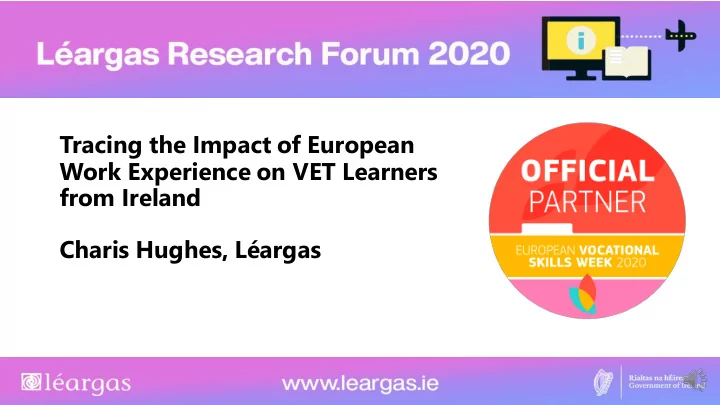

Tracing the Impact of European Work Experience on VET Learners from Ireland Charis Hughes, Léargas
Tracing VET Graduates with Foreign Mobility Experience (upcoming publication, FRSE Poland) • Transnational research on the education and career paths of vocational learners with foreign mobility experience • Austria, Belgium (Flanders), Czech Republic, Ireland, Latvia, Luxembourg, Latvia, Slovakia, United Kingdom and Poland • Compare national contexts: trace longer-term personal outcomes; explore relevance to needs and labour market
Ireland: Scope and Method • Leonardo da Vinci 2007-2014 & Erasmus+ 2014-2018 • 47-question survey: 335 responses (22% response rate. Erasmus+ participants 95% of total) • Four semi-structured one to one interviews • Two college-based focus groups, 12 participants total
Current Context • COVID-19 • Solas FET Strategy 2020-2024 • Increased funding in new programme • Brexit: Potential loss of UK as receiving country for Ireland and likely increase in demand for Ireland as receiving country from elsewhere Already popular relative to size and population: 468 incoming v 388 for France
Type of Education Institution Duration 60% 53% College of Further Education 86% 7% 7% 50% 40% 0% 10% 20% 30% 40% 50% 60% 70% 80% 90% 100% College of Further Education Apprenticeship (work-based training) Other 31% 30% Gender 20% Female 71% 28% 10% 8% 7% 1% 0% 10% 20% 30% 40% 50% 60% 70% 80% 90% 100% 0% Female Male Other/prefer not to say 2 weeks 3 weeks 4 weeks 1-3 months More than 3 months
Learners’ Overall Assessment of Mobility Experience • 90% remembered their placement positively or very positively • 70% gained practical professional experience • 64% learned elements of their profession that they could not otherwise learn in school or college • 60% encountered work cultures and environments that were different from Ireland, and learnt how these workplaces function differently from Ireland.
Q11 "To what extent did your placement abroad allow you to acquire, develop or improve the following competences?" 0% 10% 20% 30% 40% 50% 60% 70% 80% 90% 100% Interpersonal skills (e.g. customer service, 7% 11% 21% 32% 25% 5% negotiations, sales) Ability to work in an international environment 2% 5% 17% 35% 40% 1% Communication and team-working skills 3% 4% 14% 38% 41% 0% Awareness of the characteristics of individual 4% 7% 21% 41% 24% 2% workplaces Ability to operate specialist machinery and equipment 33% 14% 12% 14% 8% 19% Use of latest technologies or software 27% 17% 20% 16% 7% 12% Dealing with specialist and/or technical documentation 27% 15% 23% 16% 6% 14% Communicating in a foreign language in a work 16% 16% 26% 22% 13% 7% environment Not at all Only a little To some extent A lot Completely Not applicable
• ‘Taster’ of vocational area: real-world vocational experience is often unavailable at home • Increases soft skills like confidence, independence, self-sufficiency – particularly evident in those who live at home • Contributes to development of vocational skills, particularly in longer-term placements • Promotes inclusion through funding but also through structure and support
Subsequent Paths • 93% still based in Ireland • 46% still studying VET, 54% had completed VET education • Of these, half had progressed to Higher Education and half to the labour market • Of those in Higher Education, 70% said their course of study was related to their vocational training; half said their work placement influenced their choice of course.
Employment status of respondents no longer in VET education 70% 63% 61% 60% 50% 40% 30% 21% 20% 19% 17% 20% 10% 0% Full-time employment Part-time employment Not in employment Degree-level graduates VET education only
"Which of the following best describes your employment situation?" 60% 48% 50% 40% 30% 24% 20% 13% 7% 10% 4% 3% 0% Self employed/own company Permanent employment contract Fixed long-term employment contract (>1 year) Fixed short-term employment contract (<1 year) Employed via an agency Other
Relevance of Skills to Labour Market ‘Employable’ people “not only know their technical area or specialism but can also apply the knowledge and skills they have in varied and dynamic situations which allow them to develop their skills further” Capable people are deemed confident in their ability to: • take appropriate action effectively; • explain what they are hoping to achieve; • engage successfully in life and work with others; • continue their learning through their experiences in a changing world. “ Future Ready: Improving Graduate Employability Skills ”, Irish Business and Employers Confederation 2018
Learners’ Assessment of Impact on Employability • 70% said their participation had helped them get a job • 65% felt vocational placements abroad have a real impact on future career development • 55% said vocational placements made it easier to find work abroad • 48% said they had easier access to the labour market because of their placement abroad
What Would Participants Change? • Matching of placement to learner • Selection process • Language training • Duration • Awareness of opportunity
Conclusions Key benefits for participants are the development of competences and skills, broadening of horizons, development of new personal and professional connections. Sending organisations provide exemplary support, which – along with European funding – contributes to social inclusion.
Recommendations • Preparation: Peer-to-peer; project-based learning may contribute to sense of ownership and responsibility • Preparation: Consider role of virtual mobility in matching placement to learner • Element of language training • Consider flexible placements or longer duration • Increase awareness of opportunity – VET Skills Week!
Recommend
More recommend